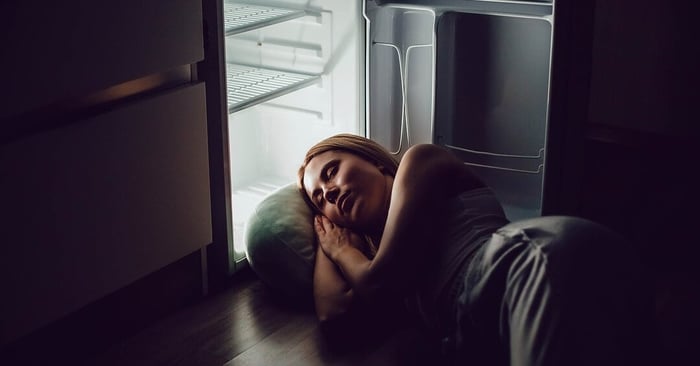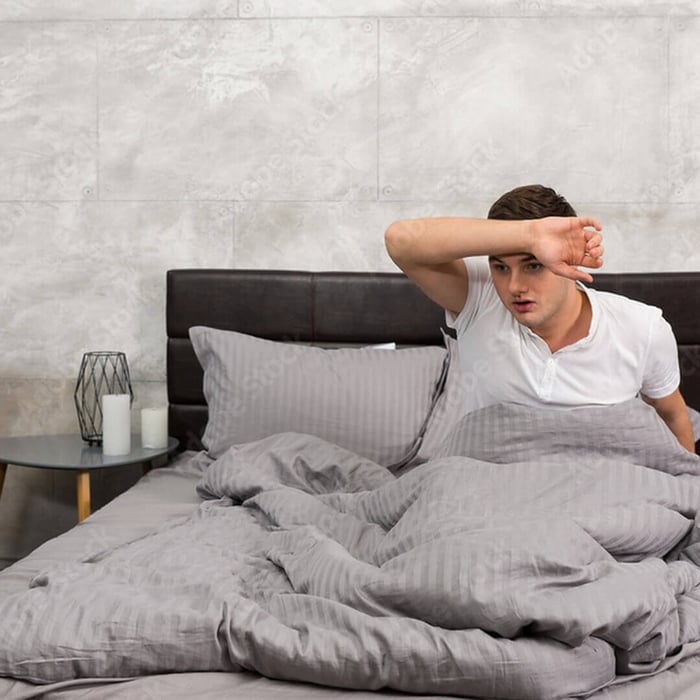Table of Contents
- What Causes Night Sweats? Understanding Why You Overheat at Night & How to Fix It Naturally
- 🌡️ What Causes Night Sweats? The Core Explanation
- 🔥 1. Hormonal Fluctuations
- 😰 2. Stress, Anxiety & Cortisol Spikes
- 🦠 3. Illnesses, Infections & Immune Response
- 💊 4. Medications That Trigger Night Sweats
- 🛏️ 5. Your Bedding & Sleep Environment
- 6. Sleep Cycles + Thermoregulation Errors
- ❄️ So… What’s REALLY Causing Your Night Sweats?
- 🌬️ Natural Solutions for Night Sweats
- 🛏️ The Best Bedding for Night Sweats
- Final Thoughts: Finding Relief From What Causes Night Sweats
- FAQs on Wool Duvet Inserts, Comforters & Sustainable Bedding
What Causes Night Sweats? Understanding Why You Overheat at Night & How to Fix It Naturally
If you’re waking up drenched, overheated, or kicking off your covers at 2 a.m., you’re not alone. Night sweats are one of the most common sleep disruptions — and while everyone experiences them differently, they all come back to the same big question: what causes night sweats?
Whether it’s night sweats and men, night sweats and women, or simply nighttime overheating, understanding the underlying causes is the first step toward finally getting cooler, calmer, deeper sleep.
Let’s break down the real reasons behind night sweats, where they come from, and how to stop them naturally — without medication, guesswork, or synthetic “cooling” gimmicks.
This is part of our Ultimate Guide to Cooling Bedding, where we show you how to build a complete heat-venting sleep system.
🌡️ What Causes Night Sweats? The Core Explanation
Simply put, night sweats happen when your internal temperature regulation system overreacts. The hypothalamus — your body’s thermostat — senses a small temperature rise and triggers a full cooling response: sweating, flushing, overheating, and sudden wake-ups.
This can happen for dozens of reasons, but most fall into a few major categories.
🔥 1. Hormonal Fluctuations
Hormones directly affect body temperature, which is why night sweats are extremely common during:
Perimenopause
Menopause
Andropause (low testosterone in men)
Menstrual cycle changes
Postpartum recovery
During perimenopause, hormonal rises and drops are more erratic, leading to intense night sweats and women episodes even in a cool bedroom.
In menopause, levels stay consistently lower, which still causes hot flashes and night sweats, but often with more predictable patterns. Understanding which phase you're in helps you anticipate nighttime sweating and adjust your sleep environment accordingly.
In night sweats and men, testosterone levels naturally decline with age, and that hormonal shift can send mixed signals to the hypothalamus.
This often results in nighttime overheating, flushing, or sweating that men don’t always associate with hormones. Many men report heat surges that appear suddenly, particularly at night, when the body is supposed to cool down for deep sleep.
Understanding what causes night sweats often starts with your body’s internal thermostat — the hypothalamus — and how it responds to even small changes in temperature. When your core temperature shifts suddenly, your body attempts to cool itself through sweating, even if your room feels comfortable.
This is why hormonal fluctuations, stress, alcohol, or even certain foods can trigger unexpected heat surges at night.
If you’ve ever woken up damp without feeling particularly “hot,” it’s because your temperature-control system is reacting faster and more intensely than during the day.
For many people, this is the missing link in understanding what causes night sweats on a physiological level.
😰 2. Stress, Anxiety & Cortisol Spikes
Cortisol — your stress hormone — raises heart rate, increases core temperature, and makes night sweats far more likely.
Even if your bedroom is cool, your nervous system might be “running hot,” triggering night sweats during REM or light sleep.
Stress-related night sweats are extremely common in both men and women. Big life changes, work overload, emotional intensity, or unresolved anxiety can all spike nighttime cortisol. This produces sudden nighttime heat surges, even in people who don’t typically sleep hot.
🦠 3. Illnesses, Infections & Immune Response
When your immune system detects infection, it raises your body temperature to fight it — which can trigger night sweats.
Common culprits include:
viruses (flu, colds)
bacterial infections
fever recovery
Most of the time, these are temporary.
💊 4. Medications That Trigger Night Sweats
Some medications list night sweats as a known side effect:
antidepressants (SSRIs)
pain medications
fever reducers
hormone therapy
steroids
diabetes medications
If your night sweats began after starting a medication, this may be the cause.
🛏️ 5. Your Bedding & Sleep Environment
Another overlooked part of what causes night sweats is the combination of heat, humidity, and trapped moisture in your sleeping environment. Even if your body is only slightly overheated, synthetic bedding or foam mattresses can amplify sweating by holding onto heat that should be released.
This creates a humid microclimate around your skin, which intensifies the sweating response and makes nighttime overheating feel far worse. Understanding what causes night sweats from an environmental perspective makes it clear why breathable fabrics and moisture-balancing natural fibers like wool can dramatically reduce temperature spikes.
That's why one of the most overlooked causes of night sweats is simply sleeping in the wrong materials. In fact, its a big reason why so-called "down alternative" might be ruining your sleep.
❌ Synthetics trap heat
Polyester, microfiber, and down alternatives hold onto heat and humidity.
❌ Memory foam stores heat
Foam absorbs body warmth and slowly releases it, keeping you hot.
✔️ Natural fibers fix the microclimate
Wool + cotton regulate temperature, wick moisture, and reduce overheating.
Organic Wool Comforter | Made in New Zealand, Breathable All-Season Comfort

$342.00
$380.00
Sleep naturally better with our organic wool comforter Unlike down or synthetic comforters that trap heat, our spun wool design wicks away moisture and prevents overheating, so you stay cool & dry. Designed for deeper sleep with a gentle weight… Read more
6. Sleep Cycles + Thermoregulation Errors
This is one of the easiest and fastest ways to reduce night sweats of all kinds.
One overlooked part of what causes night sweats is the way your body cools down during specific sleep cycles. As you transition from light sleep into deeper stages, your core temperature is supposed to drop slightly to help your brain conserve energy and repair tissue.
But when the cooling signal misfires — whether from stress, hormones, overheating bedding, or inconsistent sleep patterns — your body can overreact. Instead of a gentle reduction in temperature, it triggers a heat surge and sweating response.
This is why many people experience night sweats at the same point in their sleep cycle every night; the thermoregulation process keeps hitting a snag.
❄️ So… What’s REALLY Causing Your Night Sweats?
Here’s the short version:
If your nights are unpredictable → hormones
If it’s happening only during stressful periods → cortisol
If you recently changed medication → side effect
If you wake up hot even in winter → bedding + microclimate
If it’s sudden + intense → could be illness
Understanding the cause of night sweats helps you choose the right solution.
🌬️ Natural Solutions for Night Sweats
Here’s what actually helps:
lower your bedroom temp to 60–67°F
switch to breathable bedding
reduce alcohol + heavy meals before bed
hydrate earlier in the day
choose natural fiber sleepwear
reduce screen time / overstimulation
try light stretching or slow breathing before bed
🛏️ The Best Bedding for Night Sweats
The fastest way to reduce night sweats is to improve your sleep microclimate.
At Antipodean Home, our organic regenerative wool comforters help prevent nighttime overheating through:
instant heat dispersion
moisture vapor transfer
natural breathability
hypoallergenic, chemical-free materials
Pair it with our organic cotton sheets for hot sleepers for maximum airflow.
Regenerative Organic Cotton Sheet Set – Soft, Breathable & Sustainable

$189.00
Softer Sheets. Cleaner Sleep. Our organic cotton sheet set are simply better for the earth, and for your sleep. Grown on low-impact regenerative farms that actively heal the soil, our cotton is then woven and finished responsibly. This process eliminates… Read more
Final Thoughts: Finding Relief From What Causes Night Sweats
Understanding what causes night sweats is the first step toward reclaiming cooler, more restorative sleep. Whether the triggers come from hormones, temperature swings, stress, or a disrupted sleep cycle, small changes to your sleep environment can make a meaningful difference.
When your bedding supports natural thermoregulation instead of fighting against it, your body relaxes more easily, transitions into deeper sleep stages, and recovers the balance it’s been missing. With the right information — and the right materials around you — waking up dry, calm, and well-rested becomes your new normal.
Night sweats happen when your body’s heat regulation system gets triggered — whether by hormones, environment, stress, or illness. Understanding the underlying cause helps you address triggers and also guides your choices in sleep environment and bedding.
Explore those options to find the right balance of airflow and temperature regulation for your sleep.
Explore Our Bedding For Hot Sleepers Collection
FAQs on Wool Duvet Inserts, Comforters & Sustainable Bedding
What is the main cause of night sweats?
Hormonal changes, stress, medications, infections, and bedding that traps heat are the most common causes.
Can dehydration cause night sweats?
Yes. Low hydration can raise core body temperature, increasing sweating at night.
Do men experience night sweats differently than women?
Often, yes. Night sweats and men are frequently tied to stress, cortisol, and testosterone changes rather than hot flashes.
Are night sweats always a health concern?
No. Many night sweats are environmental or hormonal. Seek medical guidance if symptoms are sudden or severe.
Why do I overheat only during certain sleep stages?
REM sleep increases brain and metabolic activity, which can trigger nighttime overheating.
Can certain foods cause night sweats?
Yes — spicy foods, alcohol, caffeine, and sugar before bed can raise your core temperature.
Can bedding really cause night sweats?
Absolutely. Synthetic materials trap heat and humidity, causing or worsening night sweats.
What helps night sweats quickly?
Cooling your bedroom, improving airflow, and switching to breathable bedding offer the fastest relief.
Do supplements help with night sweats?
Some people benefit from magnesium or herbal supplements, but results vary.
Can stress alone cause night sweats?
Yes. Stress increases cortisol, which raises body temperature and can trigger nighttime sweating.




